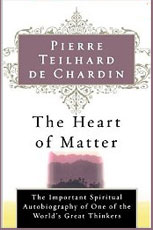The Heart of Matter is the last volume in Pierre Teilhard de Chardin's collected works. Included are several lengthy essays and assorted shorter pieces. This extraordinary French Jesuit evolutionist, paleontologist, and theologian brought to the world a vision of planetary culture designed to extend person integrity and to affirm the interrelatedness of wo/man and nature. For some Christians, Teilhard's forward-looking religious perspective is an overly optimistic and too thoroughly secular interpretation of God's people in history. Anyone who holds such a view should read these essays.
Merleau-Ponty observed that "the ambiguity of Christianity" is due to the fact that the religion of the Incarnation of Jesus Christ is revolutionary while the religion of the Father is conservative. In Teilhard's essay "Note on the Presentation of the Gospel in a New Age," he writes that one of the church's errors in modern times is that it is going its own way without considering the hopes and dreams of contemporary humankind. He challenges believers to proclaim a God who is "as vast and mysterious as the Cosmos, as immediate and all-embracing as Life, and as linked (in some way) to our effort as Mankind."
Two signs of a new world in the making are the human drive towards Spirit and the quest for a fuller consciousness of the Universe. Instead of opting for "a Christianity folded back upon its own past," we ought to be searching for and proclaiming "the area in which God and the Cosmos come together." Hence the Church must make its voice heard on issues relating to self-realization, political and social obligations to community, and cosmic duties.
If Christians believe the Incarnation of Jesus Christ is the crux of their faith, then they will be alert to the manifold ways in which his spirit is unfolding within the development of the physical world, giving it both meaning and direction. An experience of Christ compels believers to affirm human growth as it is advanced via scientific research, art, and social and political pursuits.
In another powerful essay titled "The Heart of Matter," Teilhard calls Christians to move beyond the God of Above (classic Christianity) and the God of the Ahead (the new humanism). The former "tends to under-humanize us in the rarified atmosphere of too lofty skies" while the latter "de-humanizes us under their uninspired skies." Teilhard lifts his prose to praise the cosmic Christ who knits together the splits of Matter and Spirit, Body and Soul, the Unconscious and the Conscious, and imbues us with eschatological dynamism and hope.
The Heart of Matter reveals Teilhard's valid concerns for the responsibilities and ecstasies of believers in an ever-evolving world. His propulsive view of faith, his keen sense of the Christic nature of reality, and his respect for the ideal of world community make him one of the great religious teachers of this century. Whether we can bring ourselves to a place where we will hear him afresh is another question. Teilhard's bold understanding of faith coming to life in a time of global convergence may sound too ambitious for the present when the Church seems to be in a holding pattern shoring up and rechecking its resources. But with the Church's position so identified, it becomes even more important that Teilhard's stern warning is heeded:
"In the sphere of responsibilities, a new horizon is opening up for our contemporaries, and into this Christianity must, as a matter of absolute necessity, extend the radiance of its light: otherwise it will have to pay the price of lagging behind in its teaching and of allowing man's conscience to shape itself with no reference to our faith."
